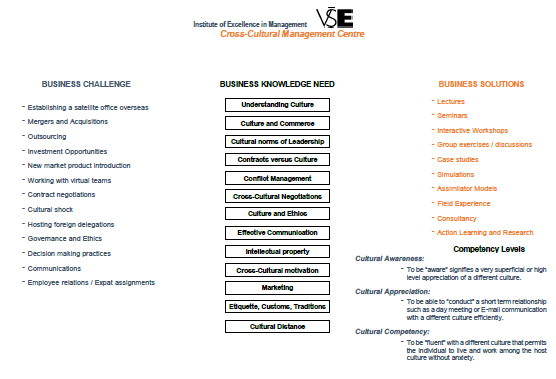Consultancy Services
Professional Shortfalls Today
Many management consultants overemphasise cultural awareness as they lack the depth of understanding needed to design, develop, and implement high impact programmes. Some diversity trainers focus on creating value that accentuates an appreciation for the ways in which cultural differences create organisational value. While this approach enriches awareness, it lacks the impact needed to build knowledge and skills.
Both consultancy and training tend to understandably focus on the knowledge component. Offering learners scholarly insights into diversity and inclusion can bring their personal values and beliefs to surface. A consultant will cover the awareness and attitude components by providing exercises that enforce the promised learning outcomes. The problem is that the skills required to negotiate differences are too often absent from this scenario. Even in a good intercultural communication course, an abundance of theory may be presented that the course does not transfer to the participants’ workplace in any practical way.
Primarily focusing on skills is inadequate. The lack of awareness of personal biases and little understanding of how personal diversity-related beliefs and values render it difficult to use the skills insightfully. The result is that our efforts to connect with people of other cultures are not viewed as credible.
The Centre Model
Our model centres on cultural competence, the ability to successfully negotiate cross-cultural differences to accomplish practical goals. It comprises four components: awareness, attitude, knowledge, and skills.
Awareness: It is important to examine diversity-related values and beliefs to recognise any deep-rooted prejudices and stereotypes that create barriers for learning and personal development.
Attitude: Values and beliefs impact cross-cultural effectiveness as they represent the extent to which we react to different views and opinions. The stronger we are attached to our beliefs and values; we respond emotionally when we encounter cultural differences.
Knowledge: The more knowledge we possess of different cultures, the more likely we are to avoid embarrassment and anxiety. Knowledge of how culture impacts problem resolution, human resource management improves intercultural interactions.
Skills: An individual may hold the proper attitude, substantial self-awareness, and countless knowledge about cultural differences, yet still lack the ability to effectively manage differences. If we have not learnt skills or have had little opportunity to practice, our knowledge and awareness are insufficient to avoid and manage cross-cultural situations.
Our model focuses on cultural competency. It increases awareness as to why learning to manage differences is advantageous for all, but also removes the principal emphasis from social engineering and concentrates on rendering participants more competent in their cross-cultural interactions. In an organisation, this translates to the discovery and identification of competency gaps and their resolution thus permitting corporate members to work more productively together.
Our difference lies with the fact that we combine both academicians and seasoned management professionals throughout the Centre Process.
The Centre Process
The Centre deploys a very proactive process of partnership. During the initial encounter, our consultant utilises interviews and/or industry-standard tests to better diagnose and assess the cultural business challenges at hand. Once identified, the needs assessment assists the Centre to understand your requirements, motivations, and behaviours. Finally, the needs are translated into tangible solutions.

The timeframe of this exercise may take from one to five business days and depends on the magnitude and circumstances related with the challenge. Throughout the process, our consultant remains in constant contact with the organisation to walkthrough suggestions, scenarios, and plausible recommendations. Once our final report is released, it has already been thoroughly reviewed by the client by means of our numerous joint work sessions.
The Centre Commitment continues beyond this process through regularly scheduled follow-up contacts and meetings to ensure that the benefits of the solution continue to meet the customer’s knowledge needs in resolving business challenges.